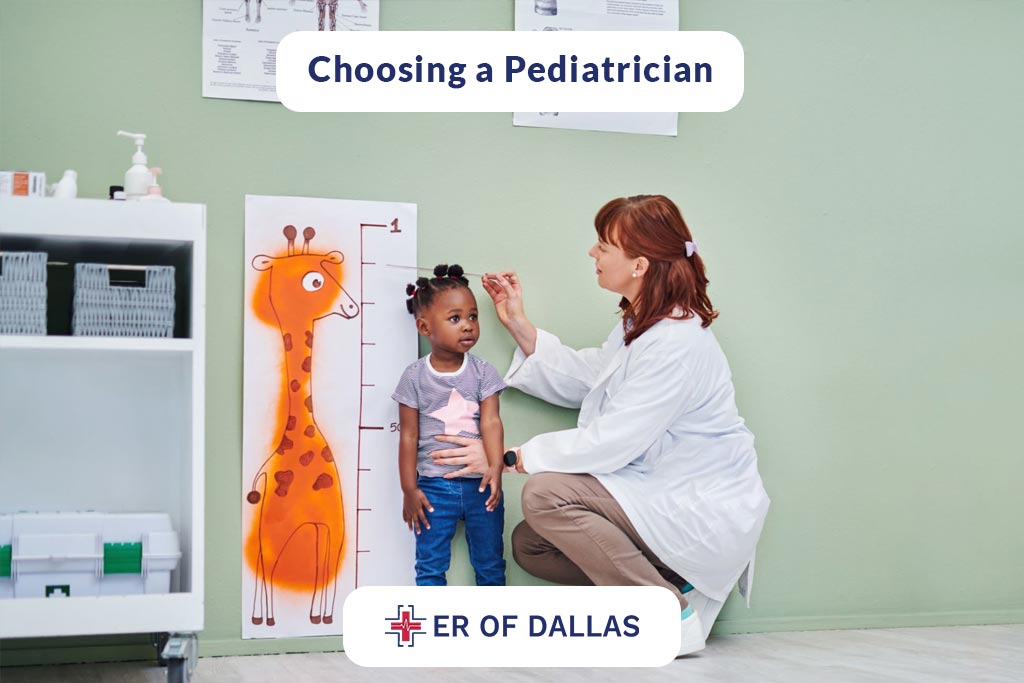Visualize a scenario where every time your child has a cough, a fever, or even really a mere bruise, it will necessarily lead you to a chaos of fear and doubts. Picture yourself as a convening angel who will be an expert medical practitioner, a nice person, and the owner and implementer of well-being procedures. This guardian angel will be able to assuage the fears in you and your child give proper guidance and boost the confidence in health courses. This guardian angel would rather land on a pediatrician.
However, those general pediatricians are the same specialists in the construction of the future generations’ health system as they study infancy, childhood, and adolescence. Pediatricians have specialized training and they exercise a compassionate approach during the treatment of children. Their main purpose is to ensure the children’s healthy growth from both physical, psychological, and social perspectives. From that phenomenal first pure and whole breath to the challenge and tears of the teen schema, pediatricians are there through it all; scientific expertise and kind care all blended.
In probing into the life of a pediatrician, one will not simply see what they do, but also how they bond with people and take a guiding role to help parents brave the maze arising from the aspect of childhood health and development.
What is a Pediatrician?
A pediatrician is a medical doctor who primarily focuses on the health care of children, starting with the age of newborns and up to the age of those young adults, who are approximately 18 to 21 years old. This focus is based on knowing that children are certainly not little-sized adults; they have different physiological, emotional, and developmental necessities that can be attended to only with adapted provision of care.

Pediatricians are the doctors who are trained to take care of kids of different age groups for various health problems such as routine check-ups, diagnosis of diseases, or treatments of diseases, and children’s growth. Not only do they master physical factors in children but also they are capable of advising on psychological and social aspects that affect situations of children.
The road to being a homo pediatrician requires numerous years of study and indoctrination. Doctors, who after medical school need to finish a residency as a pediatrician of three years, are called a residency, which usually lasts three years. The prospectus offers the opportunity to go into the depth of child health factors, including neonatology, developmental and behavioral questions, and surgeries as well.
What Does a Pediatrician Do?
Pediatricians have a real role in life in the neighborhood of the child’s health and development. They also provide broad-gauge care going beyond the acute treatment of diseases. The role of pediatricians is neither simple nor straightforward as they have to cover the physical, emotional, and social phases of infancy and young adulthood, which sometimes includes the complexity of difficult problems.

Physical health and preventive care will be addressed.
Sporting among the main responsibilities of a pediatrician is the management of the child’s physical health. This may include vital health check-ups that are vital in disclosing a child’s health defects, gauging growth, and screening for vaccination to assist in disease prevention. Routine diagnosis and treatment are also undertaken to address common conditions like colds and flu to advanced and chronic conditions like asthma or diabetes. It is Pediatricians who are experts in diagnosing and treating any problems of development from the very moment of birth till their full shot of well-being.
Emotional and Psychological Well-being
Although being free from disease is one of the vital aspects of health, pediatricians do not limit their scope to analyzing physical entities only, but they extend their scope to emotional and psychological factors. They are taught to identify the symptoms of mental health problems like anxiety and depression, and in case the person needs counseling or contact with specialists, they can offer their help. The doctor’s practice is a place where children and teenagers can safely share what disturbs them, describe what worries them, and how they would like to develop- it all will be heard by a doctor and not criticized or judged.
Social Health and Development
Some pediatricians can hardly overstate on the impact they make by counseling parents and guardians on how to go about their children’s well-being in a more wholesome way. They assist with addressing several social problems that trouble young people including those stem from relationships difficulties with peers and family members as well as problems encountered in schools. Through developing parents’ communication skills and sharing evidence-based counseling, pediatricians assist parents in making it through infancy and childhood in a rather complex world.
How to Become a Pediatrician?
The path to training as a pediatrician is a long, tough one consisting of several years of study and training aimed at gaining the knowledge and skills for treating children and their health issues. This track is meant the future pediatricians to gain the comprehensive knowledge and hands-on skills needed to aid such an exemplary group.

Step 1: Undergraduate Education
The start of the road to a pediatric job is earning an undergraduate degree. For more preparation, one may go for premed or pre-med degrees like biology or chemistry. Yet other majors that fulfill the credit hours for premedical studies are acceptable too. The majority of such programs involve biology classes, chemistry, physics, and mathematics. These are among the most important disciplines for medical students.
Step 2: Medical School
Early on, a master’s degree will follow the bachelor’s program which a length of four years will lead to a Doctor of Medicine (MD) or Doctor of Osteopathic Medicine (DO) degree. Being a medical student you will not only commit to difficult learning in the medical sciences but also have practical experience of working with a patient. In the course of their studies, students will learn some medical branches as well as take rotations across specialties such as pediatrics. This kind of experience will be very crucial to become an experienced doctor.
Step 3: Pediatric Residency
Post-graduation everyone enters a three-year pediatric residency program. This time is anxiety-ridden because residents enjoy close mentorship from well-spired pediatricians in the hospital and clinic places, and in the process, they immerse themselves into the specifics of illness prognosis, disease treatment, and child prevention. During residency, training is mainly done through being exposed to real-life medicine and the application of theoretical knowledge in caring for pediatric patients.
Step 4: Board Certification
Physicians who have completed residency can have board certification in pediatrics by passing a strict examination, such as the American Board of Pediatrics or another body that certifies the physicians. Foot certification shows pediatricians gained the highest practice in the scope of pediatrics.
How Long Does it Take to Become a Pediatrician?
The timeline to become a pediatrician involves:
- 8 semesters of tertiary study.
- 4-year total of medical education.
- Candidates with 3 years of pediatric residency training will be accepted for board certification.

Each of these contributes to 3 years with the others to result in around 11 years after completion of high school. On the other hand, doing distance training of this type can require an extension of this duration if the person chooses to advance subspecialty training in areas like pediatric oncology or pediatric interventional cardiology, which may take an additional 3 to 4 years of study.
In a nutshell, it is a long and arduous journey burning out the biological bedrock, and the sheer strength of passion and relentless commitment to the health and happiness of these young lives will define a pediatrician. This fulfilling vocation, which though rigorous yet great, is not solely about years spent in academia, but about the lives changed, and thus, our contributions to the growth and development of children.
Financial Dimensions of the Professional Background of a Pediatrician
Picking a pediatrician career is a chance for both dignity and ethical conduct and also a financially stable and lucrative career. The financial segment of a pediatrician’s occupation is affected by numerous factors. These factors can include where the physician resides, his or her many years of experience, and the setting of the practice. Let’s shift our focus to the sources of income of pediatricians as well as loans to their earnings.
How Much Does a Pediatrician Make?
Remarkably, pediatrician salaries fluctuate across the industry, with the calculated annual average being a reflection of the field’s diversity and contrast in the costing living conditions in each region. As per the latest stats, the median annual salary for a pediatrician in the USA varies in a range that remains in the competitive scale for medical specialties and it is mostly said that pediatrics is on the lower side of the scale compared to more specialized fields, generally.
Factors Influencing Income:
- Geographical Location: It should be mentioned that highly paid pediatricians live in regions with the highest cost of living and a shortage of medical specialists. Doctors working in regions that have a greater need for pediatric care or in areas with a higher living cost may demand more money too.
- Type of Practice: For instance, pediatric practitioners with their independent practice can easily have higher earnings than a doctor in an academic or hospital setting. This is because the private practitioner can attend to a larger number of patients in a day or offer specialized services which may be sometimes charged more.
- Experience: Job experience comes with a big factor which is that it determines the rate at which somebody gets paid just as many other professions. While senior pediatricians with broad experience and a large following usually earn more than first-year pediatricians, the profit disparity in the two specialties mainly depends on their increase in fees and the actual number of patients.
- Subspecialties: The additional training for pediatricians in neonatology and pediatric cardiology or pediatric oncology helps to grow the earning potential of these specialists by a big amount.
How Much Does a Pediatrician Make an Hour?
The hourly wage of pediatricians should be also the wage of doctors of the diverse nature of the above-mentioned schedules. Others can check children at regular visits performed during long hours and fixed schedules of their outpatient clinics meanwhile those, who provide pediatric consultations to hospitals, may provide care at night and on weekends considering the possible hours of their patients’ admissions.
- Average Hourly Wage: Moreover, pediatricians’ hourly wage ranges a lot, but when it is annualized and calculated using 40 hours per week for a year of regular work, the result is the same salary expectations. These could range from very little effect based on factors such as the availability of financial credit, infrastructure, and technological development to the altered conditions that could be industrious for some and distressing to others.
- Part-Time Work and Locum Tenens Roles: Many pediatricians promise to lean towards spending more time with family and friends for family life, so part-time positions and locum tenens with high hourly rates are really good for them. These roles are likely to offer an hourly wage that is a royalty relative to compensation-free jobs or lack of job security.
Choosing a Pediatrician
Parents must make a significant choice about selecting the right pediatrician; the above medical professional will be the one to take care of their children ‘s health and development from childhood to adolescence. The process involves gathering information on how to select a pediatrician and equipping oneself with the criteria to be taken along to minimize the chances of settling for mediocrity.

How to Find a Pediatrician?
The journey to finding the right pediatrician can start with several resources designed to help parents navigate through the options:
- Referrals: Seek advice from relatives, friends, or your gynecologist on clinics where you feel welcome. Buy our service to make sure you The personal experience may be worthwhile in defining a pediatrician’s communication skills and psychological states.
- Medical Boards and Professional Organizations: Amidst those, the websites of member boards of pediatric profession or organizations, including the American Academy of Pediatrics, are listed to help locate pediatricians with the certification. In this context, such resources will not only give you the necessary information concerning a pediatrician’s medical school but also give you medical training and specialty or certifications.
- Online Directories and Reviews: To find a suitable doctor for your kids, use online referral, thereby, verifying the opinion of other parents. It is also common to find these platforms with patient reviews. These reviews may be patients’ nuanced thoughts about the doctor’s way of caring and their satisfaction with the care they receive.
- Hospital Affiliations: For instance, the pediatricians associated with well-known hospitals are the one crucial thing to know. Sometimes you can find a website addressing this because the hospital builds a list of affiliated pediatricians that are covered with their credentials and specialties as well.
- Insurance Provider Directories: Call an insurance officer to get a list of possible pediatricians that take up your insurance, thus when having a visit, you will not be priced.
How Do Choose a Pediatrician?
- Credentials and Experience: The major point to do is to check about pediatrician board certification which means that they have passed the test with high standards and they are qualified for pediatric care. Pay their attention, in particular, to their expertise. They very well may have some specific medical problems.
- Compatibility and Communication Style: Choose a pediatrician whose style of communication corresponds with your beliefs. It’s crucial that you feel well with having a fair and open way to communicate with the pediatrician and that he/she listens to you and responds in a way that will be satisfactory.
- Office Environment and Staff: Examine the office setup of the pediatrician’s office and the staff. Think about the time and ease of making appointments, the cleanliness and comfort of the office, and so on.
- Location and Office Hours: About the place and time of the pediatrician’s office, the professional’s advice is important. When you are very close to home, work, or your kid’s school, this can be also one of the reasons. You also need after-hours availability for urgent issues or emergencies.
- Philosophy on Healthcare: See that your doctor’s healthcare philosophy matches yours, especially on issues where you have a strong stance like vaccination, antibiotic use, or alternative medicine. Escalation of such problems can be evaded with these concerns; thus, favorable bilateral ties can be thought of as a sine qua non.
Picking a pediatrician entails arranging your thoughts through these mentioned conditions to make certain that your child is taken care of properly according to what they require. After all, going through research and evaluation provides insights that make it easy for you to have a good relationship with a pediatrician and such a relationship can play a key role in the health and well-being of your child.
Conclusion:
In the end, the road to picking the right pediatrician for your child is a profound journey that encompasses multiple essential features: qualifications, harmony, and individual healthcare needs of your child. A consultant for pediatricians has a prominent role in ensuring the well-being and health development of the children, starting with the first year of life through the teen years. This decision is, therefore, of great significance.
For a family living in Dallas no doubt having a pediatric unit (separate child care area) available, together with having a reliable pediatric urgent care Dallas, guarantees that a childcare center will always be available when needed or necessary. The collaboration between pediatricians and emergency care providers, as well as the development of the foundation for nurses, may all contribute to the nurturing of healthy and happy children in the community.
FAQs
1. Can pediatrics meet the less usual medical requirements of children?
They certainly do, as they are trained to handle children with various special needs in their early years, for instance, children with different developmental, mental, and emotional disabilities. A lot of physicians from the field of pediatrics therefore collaborate with experts to provide holistic treatment that is adjusted to meet the unique needs of every little one.
2. What can I bring to my child’s first competence of a child visit?
During your child’s first visit bring their medical records which include a list of medicines, a record of vaccination, and information about their birth and developmental milestones for reference. Furthermore, gather a list of questions or suspected problems relating to the health and growth of your child as well.
3. How much seeing a pediatrician recommended to my baby?
The number of visits to a pediatrician depends on whether the children are infants or older and whether they are all healthy. Babies and small children primarily visit pediatricians every month or so when immunizations and development monitoring are required. As children progress and gain weight over the years, it is suggested that they have an annual check-up that will allow for the supervision of their health and development.
4. What type of physician is a family doctor and what kind of physician is a pediatrician?
Both services provide care for minors but pediatricians treat from birth right to adolescence and have expert knowledge and training on diseases of young kids. Whether it is children, teens, or adults, family doctors are ready to offer a wide range of healthcare services to any individual and the whole family.
5. How early should my child begin the process of switching from a physician who treats children to an adult doctor?
The shift from a pediatrician to an adult healthcare provider tends to happen in the age range of 18 or around 21. Although in every case an individual health condition plays a particular role, the child’s readiness for this step, and his(her) wish, the doctor may be against the idea.











